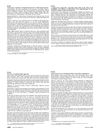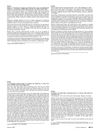 June 2022 in “Genetic engineering & biotechnology news”
June 2022 in “Genetic engineering & biotechnology news” A new hair loss treatment is being developed using reprogrammed stem cells to grow new hair follicles.
[object Object] 
The 1550 nm fractional Er:Glass laser improved hair regrowth in patients with androgenic alopecia, but didn't significantly change collagen type I, skin fibroblasts, or macrophages. More research is needed for optimal results.
 September 2016 in “Gynecology Obstetrics and Reproductive Medicine”
September 2016 in “Gynecology Obstetrics and Reproductive Medicine” Effective treatment for skin issues in women with PCOS includes oral contraceptives, antiandrogens, and other medications and procedures.
 January 2015 in “Indian Dermatology Online Journal”
January 2015 in “Indian Dermatology Online Journal” The patient's hair loss is most likely due to diffuse alopecia areata.
 January 2008 in “Journal of The American Academy of Dermatology”
January 2008 in “Journal of The American Academy of Dermatology” Trichoscopy is a helpful and quick method to identify different types of hair loss in women.
 47 citations,
December 2000 in “Archives of Dermatological Research”
47 citations,
December 2000 in “Archives of Dermatological Research” Androgens significantly affect female hair loss, and hormonal treatments may help.
 34 citations,
December 1995 in “Pediatric Dermatology”
34 citations,
December 1995 in “Pediatric Dermatology” Congenital Triangular Alopecia is a rare, non-scarring hair loss that can be surgically treated in females for cosmetic reasons.
 11 citations,
May 2009 in “Medical Hypotheses”
11 citations,
May 2009 in “Medical Hypotheses” Male pattern baldness is an unintended side effect of the body's use of androgens for muscle growth, especially in those genetically prone to it.
 5 citations,
January 2021 in “Biomedicine & Pharmacotherapy”
5 citations,
January 2021 in “Biomedicine & Pharmacotherapy” Policosanol helps treat hair loss by balancing hormones and supporting hair growth.
 January 2024 in “Journal of health reports and technology”
January 2024 in “Journal of health reports and technology” There's a significant link between the severity of Seborrheic Dermatitis and the pattern of hair loss in people with a family history of hair loss.
 September 2021 in “Hair transplant forum international”
September 2021 in “Hair transplant forum international” Synthetic hair implants can cause infection and scarring, so safer options like follicular unit excision are recommended.
 July 2021 in “IntechOpen eBooks”
July 2021 in “IntechOpen eBooks” Ginseng, especially its component ginsenosides, can promote hair growth, reduce hair loss, and potentially treat conditions like alopecia by affecting cell pathways and cytokines.
[object Object]  October 2018 in “Vestnik dermatologii i venerologii”
October 2018 in “Vestnik dermatologii i venerologii” Certain growth factors affect hair loss in women and could be targeted for treatment.
 37 citations,
October 2014 in “Maturitas”
37 citations,
October 2014 in “Maturitas” Men's hair loss is caused by hormones and genes, and can be treated with medication and surgery, while graying is due to aging and has no prevention except dyeing.
 5 citations,
May 2021 in “International Journal of Infectious Diseases”
5 citations,
May 2021 in “International Journal of Infectious Diseases” A man experienced hair loss after getting COVID-19, which improved with treatment and might have been triggered by stress related to the illness.
 4 citations,
August 1978 in “PubMed”
4 citations,
August 1978 in “PubMed” Many women's hair loss is due to health issues, medication, nutrition, or stress.
 3 citations,
January 2016 in “Skin appendage disorders”
3 citations,
January 2016 in “Skin appendage disorders” Possible causes of female hair loss include androgenetic alopecia, telogen effluvium, cicatricial alopecia, and alopecia areata incognita; diagnosis and treatment require dermoscopy and histopathology.
 1 citations,
August 2013 in “Journal of the National Cancer Institute”
1 citations,
August 2013 in “Journal of the National Cancer Institute” Early hair loss may increase the risk of prostate cancer, especially in African American men and those with frontal baldness.
July 2024 in “Vestnik dermatologii i venerologii” Post-COVID-19 hair loss is different from androgenetic alopecia and can be identified by lower copper and higher selenium levels.
 January 2024 in “The Egyptian Journal of Hospital Medicine (Print)”
January 2024 in “The Egyptian Journal of Hospital Medicine (Print)” Zinc levels are not directly linked to pattern hair loss.
 September 2023 in “JEADV Clinical Practice”
September 2023 in “JEADV Clinical Practice” People with common hair loss conditions may have a higher risk of heart disease and related health issues.
 July 2023 in “The Egyptian Journal of Hospital Medicine”
July 2023 in “The Egyptian Journal of Hospital Medicine” Using minoxidil with carboxytherapy is more effective for female pattern hair loss than minoxidil alone.
 January 2020 in “Jurnal Penelitian Perawat Profesional”
January 2020 in “Jurnal Penelitian Perawat Profesional” Panax Ginseng may help prevent hair loss.
 February 2009 in “Journal of The American Academy of Dermatology”
February 2009 in “Journal of The American Academy of Dermatology” Female hair loss can be diagnosed using specific trichoscopy criteria.
 February 2007 in “Journal of The American Academy of Dermatology”
February 2007 in “Journal of The American Academy of Dermatology” Hair tonic helps stop hair loss in most users.
 November 2023 in “Current Dermatology Reports”
November 2023 in “Current Dermatology Reports” Oral minoxidil is effective for various hair loss types and may improve male sexual function, but aspirin can reduce its effectiveness.
 September 2023 in “International Journal of Trichology”
September 2023 in “International Journal of Trichology” Adipose-derived stem cells may help with hair loss, but more research is needed.
 July 2023 in “IntechOpen eBooks”
July 2023 in “IntechOpen eBooks” Some types of hair loss can be reversed, others are permanent, and treatments vary by type.
 June 2023 in “Asian Journal of Pharmaceutical Research”
June 2023 in “Asian Journal of Pharmaceutical Research” Different types of hair loss require specific treatments, and new treatments are being developed.
 March 2023 in “Benha Journal of Applied Sciences”
March 2023 in “Benha Journal of Applied Sciences” Medications for male pattern hair loss are safe and work well.





























